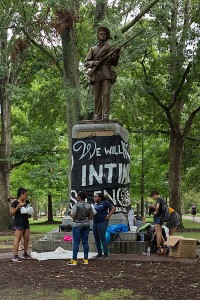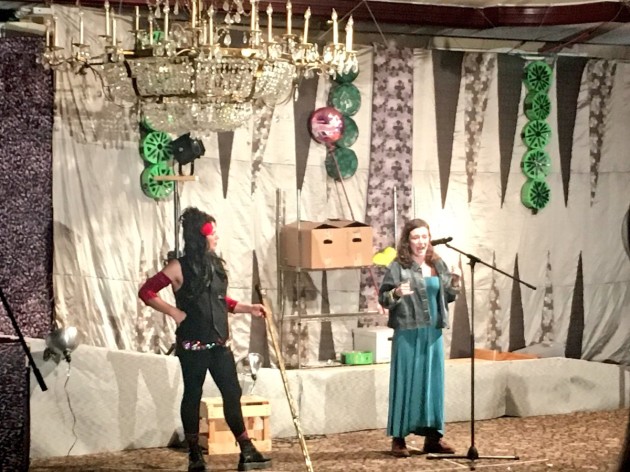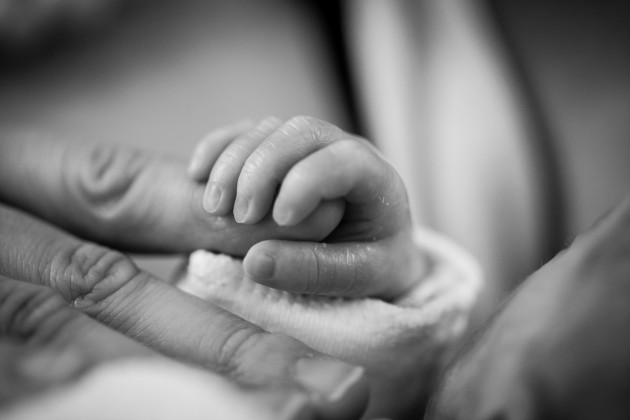Author Archives: Justine Orlovsky-Schnitzler
April 16, 2019 by Justine Orlovsky-Schnitzler
A Secular Feminist Embraces Shabbat
The first time I observed Shabbat according to the laws of the Torah, it snowed in the desert.
There was a certain degree of irony there—that hell had frozen over, and now I was celebrating the Sabbath in the home of an Orthodox friend.
I was anxious in the hours leading up to sundown, watching large, wet snowflakes blanket the cactus in my front yard. It was the kind of anxiety that comes with imposter syndrome—all my Jewish celebrations had thus far involved a wide margin of error. My partner and I didn’t worry much about saying all the right prayers in the right order, because our practices were secular expressions of our shared culture, not an expression of religious devotion.
- No Comments
August 30, 2018 by Justine Orlovsky-Schnitzler
The Confederate Statue That Haunted My Campus Is Gone. I’m Glad.
 Last week, Silent Sam–one of the most visible Confederate monuments in the South–came off its pedestal. It was yanked into the dirt by protestors, finally at the mercy of the community that had suffered under Sam’s gaze for a little over a hundred years. The last video clips and photos of the evening showed a crew hauling the statue into a dump truck and driving off under the cover of darkness, leaving behind the ropes used to tear the metal loose.
Last week, Silent Sam–one of the most visible Confederate monuments in the South–came off its pedestal. It was yanked into the dirt by protestors, finally at the mercy of the community that had suffered under Sam’s gaze for a little over a hundred years. The last video clips and photos of the evening showed a crew hauling the statue into a dump truck and driving off under the cover of darkness, leaving behind the ropes used to tear the metal loose.
I can’t remember the first time I saw Sam. It must have been on a campus tour, though I was almost certainly distracted at the time by my overwhelming fear of graduating from high school and becoming a college student. But I do remember that on my first day at Carolina, up bright and early for a lecture in a course I would later drop, I passed by the statue, the base sprayed with vomit from drunken revelers celebrating the beginning of the semester. Tourists were posing in front of it anyway.
- No Comments
March 28, 2018 by Justine Orlovsky-Schnitzler
This Jewish Student Organizer Is Fighting Against Gun Violence and School Militarization

Rosa Lander (right) speaking at JFREJ’s Purim Carnival and March.
It would be inaccurate to categorize gun violence, particularly in schools, as a new issue. Though the Parkland shooting last month has galvanized a large, primarily youth-led movement against gun accessibility, the United States has a long and deadly relationship with firearms. Though the last 20 years has seen a surge of mass shootings, deadly force has long existed in state-sponsored institutions. It is vital that those involving themselves in anti-gun activism recognize the foundations laid by groups like Black Lives Matter, while simultaneously acknowledging the role that police forces play in perpetuating institutionalized violence.
With these facts in mind, and the Parkland shooting still fresh, Jews for Racial and Economic Justice (JFREJ), in collaboration with the Aftselakhis Spectacle Committee, co-organized their Purim Carnival. Officially titled the Kids’ Purim Carnival of Resistance and Parade (co-sponsored by Kolot Chayeinu, the Workmen’s Circle, and Repair the World NYC), carnival attendees—primarily school-aged children—played justice-themed games and painted brightly colored signs before taking off on foot together for New York Democratic Senator Simcha Felder’s office in New York City. (Felder caucuses with the Republicans in the State Senate.) Staff writer Justine Orlovsky-Schnitzler called one of the student organizers, Rosa Lander, to discuss how the event transpired and what broader impact the students hoped to make.
- No Comments
March 21, 2018 by Justine Orlovsky-Schnitzler
What I Learned As a Jewish Doula in North Carolina
 There came a moment, in every labor I attended as a young doula, where the task at hand felt not only overwhelming, but entirely out of my depth. I’d usually find myself pulling back the legs of a person I had often met only hours before, struggling and squinting to see through the harsh theatre lights that descended from the ceiling shortly before delivery, all the while dodging insults directed vaguely toward anyone in the vicinity. I tried not to take anything personally. That wasn’t always enough to keep swirling self-doubt at bay. It was never a fault of confidence in my knowledge—instead, I feared that the knowledge was worthless. That for all of my soothing tones and gentle affirmative phrases of support, I wasn’t helping. The cycle of doubt came in waves, and usually subsided around the time I slipped out of the room post-birth, exhausted, to pay for the overpriced tea at hospital café amongst doctors and nurses far more tired than I. By the time I dragged myself back to bed—or to class—the most painful moments had all but evaporated from my memory, replaced by the flashes of joy only the arrival of a new human being could bring.
There came a moment, in every labor I attended as a young doula, where the task at hand felt not only overwhelming, but entirely out of my depth. I’d usually find myself pulling back the legs of a person I had often met only hours before, struggling and squinting to see through the harsh theatre lights that descended from the ceiling shortly before delivery, all the while dodging insults directed vaguely toward anyone in the vicinity. I tried not to take anything personally. That wasn’t always enough to keep swirling self-doubt at bay. It was never a fault of confidence in my knowledge—instead, I feared that the knowledge was worthless. That for all of my soothing tones and gentle affirmative phrases of support, I wasn’t helping. The cycle of doubt came in waves, and usually subsided around the time I slipped out of the room post-birth, exhausted, to pay for the overpriced tea at hospital café amongst doctors and nurses far more tired than I. By the time I dragged myself back to bed—or to class—the most painful moments had all but evaporated from my memory, replaced by the flashes of joy only the arrival of a new human being could bring.
I became a doula on one of my better whims. Never someone who felt called to the hard sciences, by my third year of undergraduate study, I’d naturally directed myself toward the humanities. I primarily dealt in history, with an emphasis on the United States. I coupled that with a major in gender studies, indulging my desire both to inform my historical analysis with a feminist lens and to read Audre Lorde for credit. Over the course of my time at the University of North Carolina at Chapel Hill, I slowly narrowed in on reproductive health as a political touchstone and cultural fuse. Studying reproductive rights meant existing at the intersection of many disciplines, where the personal contends with the political. After three years of increasingly specialized seminars and an invitation to write my senior honors thesis on legal ramifications of zone-of-privacy laws for abortion clinics, I felt almost entirely settled in the path I felt my life was taking. Almost.
I had the sense that I lacked a practical relationship with the people I spent so much time writing about.
- No Comments
November 9, 2017 by Justine Orlovsky-Schnitzler
When Your World Collapses from Acute-Onset Anxiety
 My world fell apart a week before Rosh Hashanah. One September morning I was drinking my usual four cups of tea, moving too quickly through the house, and dreaming up a thousand different ways my life could change. The next, I was awake before dawn, my breath shallow and hard to find, certain that death was imminent and the universe existed only to swallow us whole. I carried on like this for a few days—monitoring each thought and feeling as they emerged, hypervigilant and aware of myself to the point of feeling unreal. I was a moving puddle of tears and rolling fears, shuttling from bed to couch to bed again, never really sleeping in either place.
My world fell apart a week before Rosh Hashanah. One September morning I was drinking my usual four cups of tea, moving too quickly through the house, and dreaming up a thousand different ways my life could change. The next, I was awake before dawn, my breath shallow and hard to find, certain that death was imminent and the universe existed only to swallow us whole. I carried on like this for a few days—monitoring each thought and feeling as they emerged, hypervigilant and aware of myself to the point of feeling unreal. I was a moving puddle of tears and rolling fears, shuttling from bed to couch to bed again, never really sleeping in either place.
On the fifth day, I found myself between the stucco walls of the public clinic, tugging at my jeans and gently tearing apart the paper draped beneath my legs. This was the place that could see me on such short notice. I stared at the posters reminding me to make good choices, healthy choices, and I found myself muttering sadly, “I always do, I always do.”
The doctor who saw me diagnosed me with acute onset anxiety. No kidding. She inquired about my personal life, my job, my hobbies. Out of habit, I held back when I described my occupation—you never know how a stranger will react to self-identification. I told her I worked for a Jewish organization, and she must’ve sensed my hesitation. “You can tell me,” she said, without looking up from my chart, “I’m Jewish, it’s fine.” At the end of the visit, as she watched me roll my sleeve down over the spot where she’d drawn blood, she offhandedly grinned. “Anxiety passes, I promise.” I nodded mutely. “For people like us”, she continued, “It’s in our nature to be worried.” People like us. The floor opened up and devoured me, and I showed all my teeth as she trundled me off to the psychiatric nurse.
- 3 Comments
 Please wait...
Please wait...